
Copyright: Turath Publishing 1437/2016
ISBN: 978-1-906949-12-9
eISBN: 978-1-906949-72-3
Published by: |
Turath Publishing |
79 Mitcham Road | +44 (20) 8767 3666 |
London SW19 9PD | www.turath.co.uk |
All rights reserved. No part of this publication may be reproduced, stored in any retrieval system, or transmitted in any form or by any means, electronic or otherwise, without written permission of the publishers.
Author | Imm Ab mid Muammad al-Ghazl |
Translation | Nasir Abdussalam |
Editing & Footnotes | Mariam Madge Conlan |
General editor | Yahya Batha |
British Library Cataloguing in Publication Data
Al-Ghazl Muammad ibn Muammad Imm Ab mid
Title The Forty Principles of the Religion (Al-Arban f Ul ad-Dn)
I. Title
Cover design & typesetting | ARM (www.whitethreadpress.com) |
Printed by | Mega Printers, Istanbul, Turkey (mega.com.tr) |
Distributors for UK & Europe
Azhar Academy Ltd.
5456 Little Ilford Lane
London E12 5QA
www.azharacademy.com
Distributors for America & Canada
White Thread Press
www.whitethreadpress.com
Distributors for South Africa
Darul-Ihsan Research and Education Centre
www.darulihsan.com +27 (31) 577 7868
To my two dear friends and my guides in life,
Muft Dr. Kamal Uddin Ahmed &
Muft Dr. Abdur-Rahman Mangera,
whose practice and teaching of Imm al-Ghazls
works have benefitted many. I pray that Allh
accepts their efforts. mn.
YAHYA BATHA
(Publisher)
CONTENTS
Part One
THE SUM OF KNOWLEDGE AND ITS PRINCIPLES
Part Two
OUTER ACTIONS
Part Three
PURIFYING THE HEART FROM BLAMEWORTHY CHARACTERISTICS
Part Four
PRAISEWORTHY CHARACTER TRAITS
FOREWORD

I n the name of Allh, Most Gracious, Most Merciful. All praise is to Allh, Lord of the Worlds, who created mankind on the natural faith (firah), guided them through prophets, scriptures and signs, divinely enabled the obedient and righteous among them to choose the way of salvation, promised them His pleasure, and prepared for them the Eternal Gardens. May Allh send His abundant blessings and peace on His Messenger of Mercy, Muammad  , and on his family and followers into limitless eternity.
, and on his family and followers into limitless eternity.
The human body starts off as a limp, lifeless and dark substance. When the soul enters it, the body becomes alive and illuminated, as do the five senses. However, the soul in its initial state is also dark and without awareness. When bestowed with intellect, it too becomes bright and illuminated. Similarly, the intellect is also not complete in its illumination, sharpness and purity until it matures. This occurs through recognition of its Creator and His Attributes, knowledge of the states of souls and bodies, and realising the reality of the two worldsa gnosis which is achieved by means of the Qurn and Divine Revelation. In other words: the Qurn provides knowledge of the Divine which illuminates the intellect; the matured intellect then illuminates the soul, which in turn illuminates the body and gives it life.
This book by the great sage and Proof of Islm, Ab mid Muammad a-s al-Ghazl (d. 505/C. 1111), details the nurturing of the ideal human being and his connection with his Creator. It discusses the soul, the states of servitude, obedience and disobedience, praiseworthy and blameworthy character, illumination and purification of the heart, success and salvation, and this transient world and the eternal abode of the afterlife.
Many great individuals have passed through this world, but not all have left their mark on Islm as Imm Ghzl did. In his student days, he was fortunate to have studied under one of the greatest scholars of his time, Imm al-aramayn Abd al-Malik al-Juwayn, in Nishapur. This teacher recognized Imm Ghazls outstanding intellectual gifts and used to say that Ghazl possessed encyclopedic knowledge. Later, the student was said to have surpassed his teacher. Imm Ghazl was not only recognized as an intellectual genius, but also became one of the most influential scholars of Sufism. Having achieved probably the highest academic post in the Muslim world at that time as the rector of the Nimiyyah College in Baghdad, he decided to abandon this position and embarked on a life of seclusion. He spent over a decade in solitary meditation and contemplation, enjoying the bliss of spiritual visions. He could have remained in this state until his death but God had destined for him otherwise. Ghazl saw that many challenges had confronted the Muslim Ummah. He observed that the faith of many was shaken, conviction had been lost, and religious practices had been reduced to lifeless forms. He says:
I realised that I could easily remove their doubts. I saw myself, in fact, fully capable of exposing the hollowness and implausibility of their philosophical convictions because of my deep knowledge of the speculative sciences. I therefore felt an ardent desire to take up this work, since it appeared to be the crying need of the time. I said to myself, How does it befit you to sit in seclusion? It is an epidemic that is spreading like wildfire, and the learned have themselves fallen victim to the same disease? The servants of Allh have reached the brink of destruction.
He finally returned to teaching in 499, this time to the Nimiyyah College in Nishapur, and took up his revival efforts, writing several enduring works.
Imam Ghazl is well-known today for this literary legacy. Many of his spiritual works embody a sense of understanding and urgency that is hard to find in other works. He discusses issues in a very practical and holistic way, while all his advice and conclusions are based on their impact on the hereafter. For a person of faith, there can be no other beneficial approach, since any decision made only for this worldas most decisions areis limited to this world and cannot include the hereafter. In contrast, any decision made with the hereafter in mind must include this world, since all pass through it to reach the next world.
One of the most celebrated works of Imm Ghazl is his magnum opus, Iy Ulm ad-Dn (The Revival of the Religious Sciences), which he wrote on his return. Readers of it will discover that he aims at nothing less than nurturing a perfect slave of God and a genuine human personality. He tackles each topic in a comprehensive manner, weaving together the relevant Qurnic verses, Prophetic narrations, anecdotes and counsels from great sages, and employing his outstanding eloquence and psychological insight to get his points across. He takes no prisoners and fearlessly says things as they are. Scholars, traders, the ruling elite and laypeople are all addressed according to their frames of reference and relevant examples. Ghazl appears as an expert psychologist, sociologist, theologian, philosopher, religious preacher and spiritual guide all in one, his words tugging at readers heartstrings, beautifying their minds, and beckoning them to take up a life of piety and purify their souls before it is too late.
Some of his accounts of ascetics and worshippers may appear extreme and a number of his prescriptions may seem unattainable in the materialistic times we live in. However, they should not be arbitrarily dismissed, for they serve the important purpose of shocking people into realisation, waking them from their intoxicated states and inspiring them to a life of steadfastness rather than a perilous existence on the edge of spiritual destruction.
Next page
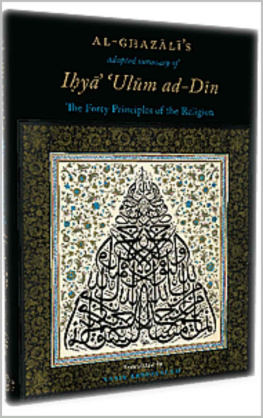

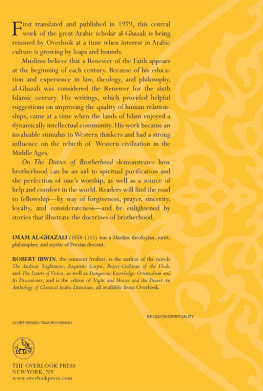
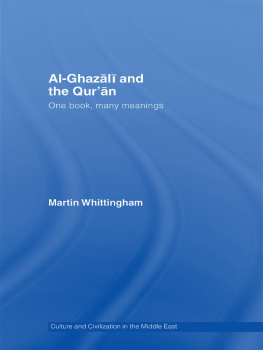

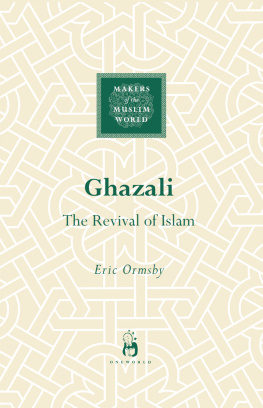
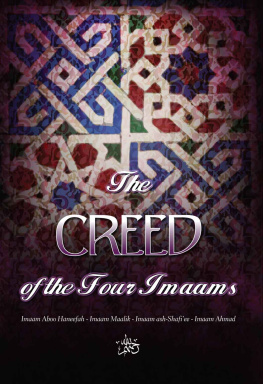
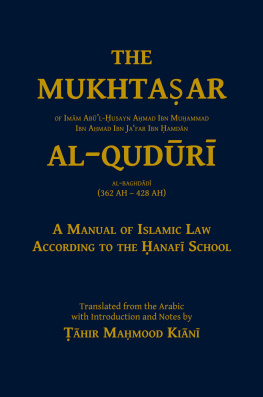
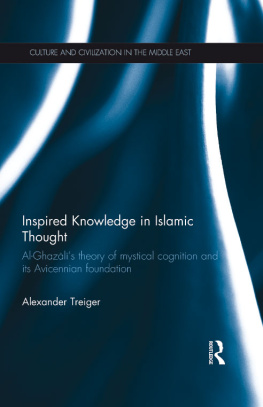


 , and on his family and followers into limitless eternity.
, and on his family and followers into limitless eternity.